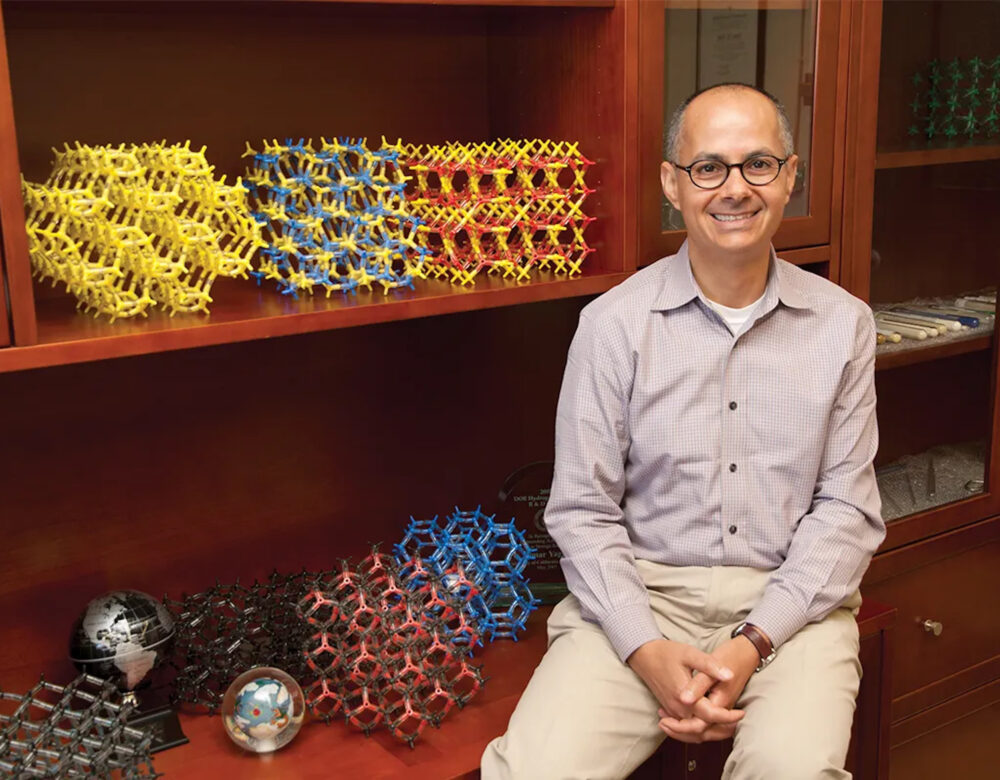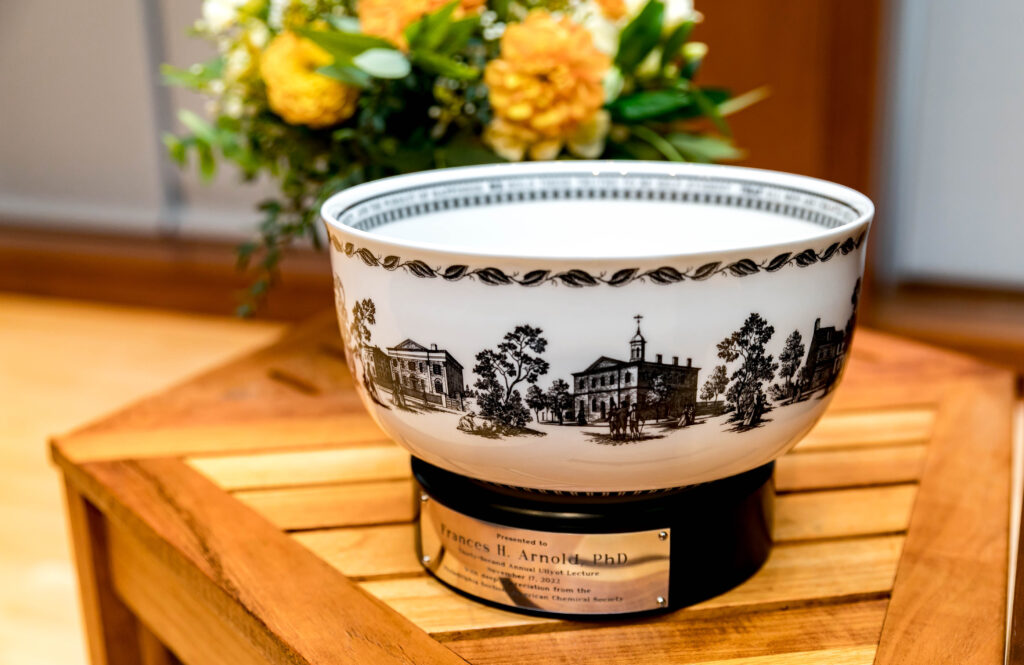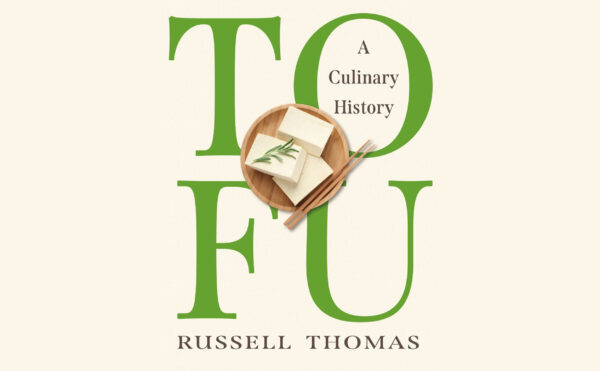Ullyot Lecture and Award: Omar Yaghi

The 2024 Ullyot Public Affairs Lecture and Award featured reticular chemistry pioneer and Berkeley professor Omar Yaghi. A Q&A session and the presentation of the Liberty Bowl followed Yaghi’s lecture.
Yaghi highlighted how 30 years of establishing the basic science of reticular materials has led us to carbon capture from air and flue gas, and harvesting water from air to produce drinking water in various parts of the world regardless of temperature and humidity levels. He discussed and presented results on his efforts in taking this technology from the laboratory to the field, including the design and engineering of prototypes.
The clean air, clean energy, and clean water challenges facing our planet today impact our health, wealth, happiness, and future. These three stresses present difficult science and engineering problems to solve as they require the selective capture of small molecules, including hydrogen, methane, carbon dioxide, and water, among many other aspects. Our ability to capture, store, manipulate, and harness the power of these molecules in an efficient and economical manner is paramount to our success in building a sustainable future.
The emerging field of reticular chemistry and materials has yielded extensive classes of nanoporous metal-organic frameworks (MOFs) and covalent organic frameworks (COFs). The flexibility with which these materials can be made, modified, and scaled bodes well for their integration into devices and providing robust solutions to these challenges. The establishment of MOFs and COFs as a global research activity has led to an infinite number of materials, which when coupled with the engineering of devices, offers new, unparalleled opportunities for solving the three stresses facing our planet.
Agenda
- 6pm–7pm | Lecture
- 7pm-8pm | Reception
About Omar Yaghi
Omar Yaghi is the James and Neeltje Tretter Chair Professor of Chemistry at the University of California, Berkeley. His work encompasses the synthesis, structure, and properties of inorganic and organic compounds and the design and construction of new crystalline materials.
Yaghi is widely known for pioneering several extensive classes of new materials: MOFs, COFs, and zeolitic imidazolate frameworks (ZIFs). These materials have the highest surface areas known to date, making them useful for such purposes as hydrogen and methane storage, carbon capture and conversion, water harvesting from desert air, and catalysis. The building-block approach he developed has led to an exponential growth in the creation of new materials having a diversity and multiplicity previously unknown in chemistry. He termed this field reticular chemistry and defines it as “stitching molecular building blocks into extended structures by strong bonds.” His work on MOFs, COFs, and ZIFs led to over 300 published articles, which have received a total of more than 227,000 citations.
Yaghi is the founding director of the Berkeley Global Science Institute, whose mission is to build centers of research in developing countries and provide opportunities for young scholars to discover and learn. He is also the codirector of the Kavli Energy NanoSciences Institute, focusing on the basic science of energy transformation on the molecular level; the California Research Alliance by BASF, supporting joint academia-industry innovations; as well as the Bakar Institute of Digital Materials for the Planet, which aims to develop cost-efficient, easily deployable versions of two classes of ultra porous materials to help limit and address the impacts of climate change.

He is an elected member of the U.S. National Academy of Sciences (2019), the American Academy of Arts and Sciences (2022), and the German National Academy of Sciences Leopoldina (2022). He has also been honored with many awards, including the Sacconi Medal of the Italian Chemical Society (2004), Materials Research Society Medal (2007), American Chemical Society Award in the Chemistry of Materials (2009), Royal Society of Chemistry Centenary Prize (2010), King Faisal International Prize in Science (2015), Albert Einstein World Award of Science (2017), BBVA Foundation Frontiers of Knowledge Award in Basic Sciences (2017), Wolf Prize in Chemistry (2018), Eni Award for Excellence in Energy (2018), Gregori Aminoff Prize by the Royal Swedish Academy of Sciences (2019), August-Wilhelm-von-Hofmann-Denkmünze of the German Chemical Society (2020), Royal Society of Chemistry Sustainable Water Award (2020), Belgium’s International Solvay Chair in Chemistry (2021), VinFuture Prize for Emerging Science and Technology (2021), and the Wilhelm Exner Medal (2023).
Yaghi received his PhD in chemistry from the University of Illinois at Urbana-Champaign and was an National Science Foundation Postdoctoral Fellow at Harvard University.
About the Ullyot Public Affairs Lecture
The Ullyot Public Affairs Lecture emphasizes the positive role that the chemical and molecular sciences play in our lives. It’s presented in partnership with the Philadelphia and Delaware Sections of the American Chemical Society, the Department of Chemistry at the University of Pennsylvania, the Department of History and Sociology of Science at the University of Pennsylvania, and the Department of Chemistry and Biochemistry at the University of the Sciences.
More events
Othmer Library Tour
Curious about the other half of the Science History Institute? Step into the Othmer Library of Chemical History!
Stories of Science: We ❤︎ Chemistry!
Join us in our museum EVERY SATURDAY for a family-friendly program that highlights strange and surprising stories from the history of science!
Tofu: A Culinary History
Food historian Russell Thomas traces the remarkable journey of tofu from its ancient origins in East Asia to its global rise as a staple of modern plant-based cuisine.



